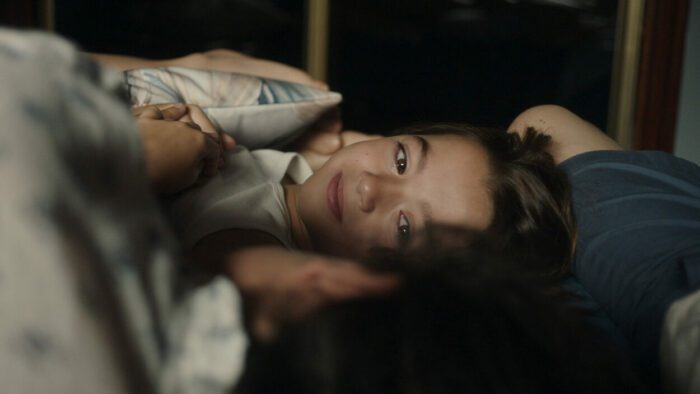Legitimately one of the best pieces of trans representation I’ve ever seen, Estibaliz Urresola’s feature debut 20,000 Species of Bees manages to be sensitive, uncompromising and infinitely wise and compassionate. Combined with Sedimentos—a film which feels more groundbreaking and significant with each passing day—it makes rural Spain an unlikely locus of solidarity and mutual understanding for trans women and girls. It also follows in the footsteps of films like Tomboy, presenting the coming of age of a trans child, in this case eight-year-old Lucia (Sofia Otero), as she realizes over the course of ten formative days, that she is not merely a sensitive boy with feminine tastes as her mother Ane (Patricia Lopez Arnaiz) insists, but simply a girl.
20,000 Species of Bees pushes back against so many misconceptions about trans children not through polemic or rhetoric but simply by forcing the viewer to sit with the reality of the experience innocently, and so come to understand the situation as a child must see it. There’s no one pressuring Lucia to explore her feminine side or sexualize herself prematurely, she merely identifies with the icons of femininity around her more than she does the masculine ones. She is in every respect, an ordinary little girl, except grown ups think she shouldn’t be.
The film also acts as a study of three generations of women in this family: grandmother Lita (Itziar Lazkano), a closed-minded bookkeeper; great aunt Lourdes (Ana Gabarian), an open-minded beekeeper; mother Ane, a sculptor struggling to follow in her celebrated father’s footsteps, and aunt Leire (Sara Cozar), a traditionalist mother. Each of these women’s perspectives pulls on Lucia’s self-discovery in a different way, resulting in scenes as wholesome as Great Aunt Lourdes gently giving her the opportunity to speak if she wishes, or as frustrating as shouted conversations about but not including Lucia, overheard through doorways as the girl in question lies in bed, tearfully holding her brother’s hand.

Despite the opportunity being there, the film resists melodrama at every turn, adopting a decisively realist gaze that gives the illusion of a story telling itself, an illusion completed by the tactful yet challenging writing and the completely naturalistic performances, all of which are fantastic. Much of the praise has rightly centered on Otero, whose graceful and utterly convincing performance won the best actor prize at Berlin, but the whole cast are superb, with Arnaiz’s performance as the liberal but inexperienced and conflicted mother for whom Lucia’s inexorable coming out is but one of many competing demands for her attention equally stunning. She is sincere in her desire to understand and support her child, but it’s still a painful process as she’s grappling with a lot of individual shame herself, much of which she’s inherited from her own parents. It’s a humbling realization that you don’t actually know what’s best for your child, especially for a woman as fiercely independent as Ane.
The film’s use of symbolism veers on forced at times, but it’s never overplayed and manages to add texture to the film and expand it beyond a purely realist portrayal. 20,000 Species of Bees is one of many recent films that reinforces the subversive fact that the progressive ideals of today reach back further, and are more ancient and natural than the judgmental piety of yesterday, portraying a subtle conflict between the harsh, intractable, patriarchy of the cast metal sculptures of Lucia’s grandfather, and the pliable natural world of their beeswax molds, between the orderly dysfunction of the city and the free and mellifluous world of nature where everything is as it is and has its own organic place. The film also draws iconoclastic, and accurate, parallels between the conviction of faith and the conviction of identity. Belief in what you are is as deep seated as belief in God or in right and wrong. The Christian symbolism looks for a while like it’s going to be taken too far, but the film thankfully backs away from anything too crass.
Likewise the subplots following Ane and other family members add weight to their perspectives and decisions, allowing the viewer to empathize with them and understand their point of view amid the pressures of not just a divided family but financial woes and career aspirations. These subplots do threaten to unbalance the film at times. They’re involving in their own right and indirectly relevant, with Ane’s self-doubt about following in her father’s footsteps and harsh discoveries about her parents’ marriage fueling her sense of shame and inner conflict, but I’ll admit I was only moderately engaged by them and they began to elicit a marked drop in my attention whenever we cut to them and away from Lucia’s story. But that has more to do with how great the film’s core is, however diluted. The scenes focusing on Lucia’s tentative and fretful self discovery are exceptionally well judged, poignant and inherently credible. The film has clearly emerged as the end point of a wealth of personal experience and assiduous research, carrying itself with tremendous empathy but without a surfeit of delicacy. It’s as direct in its portrayal of transphobia as it is of transness, but doesn’t ever revel in it, just portrays it in its frustrating, mundane intransigence.
Like the rest of us, Lucia is going to be dealing with people not accepting or understanding her for a fair few years yet. However, those people who do give her space, who do shut up and listen, who do accept her as she is and make that acceptance felt, those people will have a far bigger impact on her than any ignorant stranger who refuses to.



